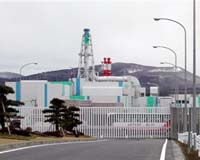 |
Hong Kong (AFP) March 12, 2011 A US radiation expert says cooling is the key to averting disaster at the quake-hit nuclear plant in Japan, it was reported Saturday. The Fukushima No. 1 plant, located about 250 kilometres (160 miles) northeast of Tokyo, was hit by an explosion Saturday, raising fears of a radioactive meltdown, a day after a huge quake damaged its cooling system. Ron Chesser, director for the Center of Environmental Radiation Studies at Texas Tech University, was the first American scientist allowed inside the exclusion zone in 1992 in Ukraine following the Chernobyl disaster. "The fact they're having trouble cooling the reactors is going to trigger an emergency," Chesser told the ScienceDaily website in the US. Chesser said that though reports have said the plant's reactors were shut down safely, the reactors must still be cooled constantly to avoid a meltdown of the core. "There are certain trigger points for declaring an emergency at nuclear reactors. Reduction in cooling capacity would be one of those. Release of radiation would be another. "Reactors are not like your car that you can turn off and walk away. They're going to continue generating a great amount of heat until the core is disassembled. "Without cooling water, then you stand a real chance of a meltdown of core that could result in a large release of radiation, potentially." Chesser, who has toured a smaller Japanese nuclear power plant in Chiba, added that Japanese designers put many precautionary measures and contingency plans in place to ensure reactor safety in the event of an earthquake. "I was very much impressed with the amount of attention to safety, especially regarding potential of earthquakes," he said. "I was a little bit surprised when I saw they had a looming crisis at the Fukushima power plant just because of all the great attention the Japanese pay to earthquake safety." Also, the Fukushima reactors appear to have containment vessels over them, unlike those in Chernobyl, he told the publication. "Any time you have a nuclear facility that size that is not meeting requirements for cooling, you have a real emergency on your hands," he warned. "My great hope is that they are going to be able to rectify this quickly enough that they can maintain cooling capacity," Chesser said. "I think that a reactor meltdown could be a major disaster, especially in a highly populated country such as Japan. It would be a real setback when we are battling to find alternatives to fossil fuels considering the potential that nuclear energy has."
Share This Article With Planet Earth
Related Links Nuclear Power News - Nuclear Science, Nuclear Technology Powering The World in the 21st Century at Energy-Daily.com
 Japan scrambles to stop quake-hit nuke plant accidents
Japan scrambles to stop quake-hit nuke plant accidentsTokyo (AFP) March 12, 2011 Japan scrambled Saturday to prevent nuclear accidents at two atomic plants where reactor cooling systems failed after a massive earthquake, as it evacuated tens of thousands of residents. Radiation 1,000 times above normal was detected in the control room of one plant, although authorities said levels outside the facility's gates were only eight times above normal, spelling "no immediate hea ... read more |
|
| The content herein, unless otherwise known to be public domain, are Copyright 1995-2010 - SpaceDaily. AFP and UPI Wire Stories are copyright Agence France-Presse and United Press International. ESA Portal Reports are copyright European Space Agency. All NASA sourced material is public domain. Additional copyrights may apply in whole or part to other bona fide parties. Advertising does not imply endorsement,agreement or approval of any opinions, statements or information provided by SpaceDaily on any Web page published or hosted by SpaceDaily. Privacy Statement |